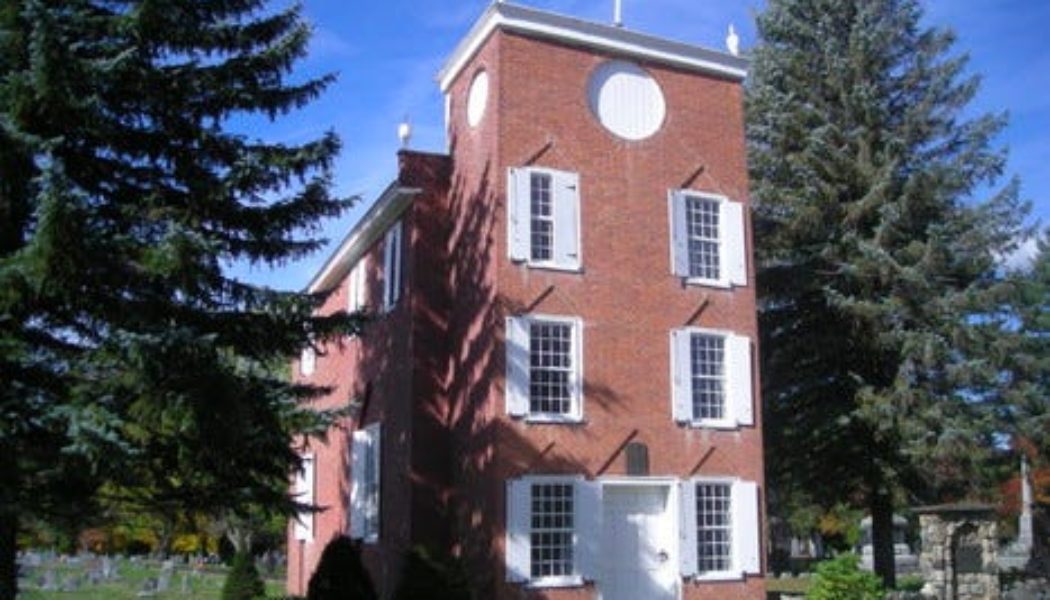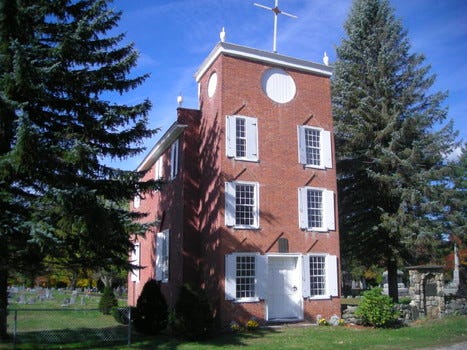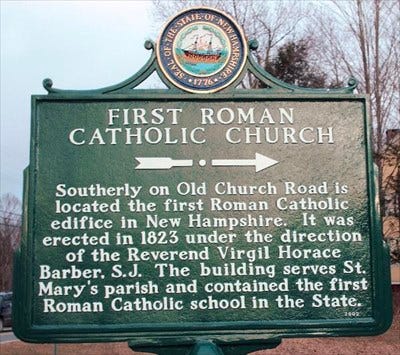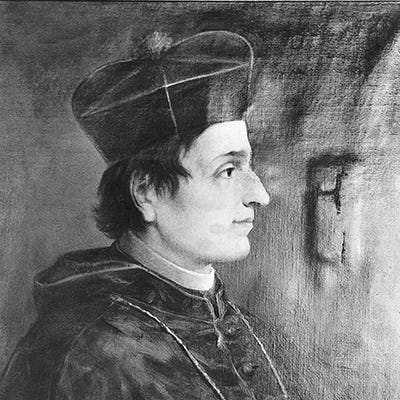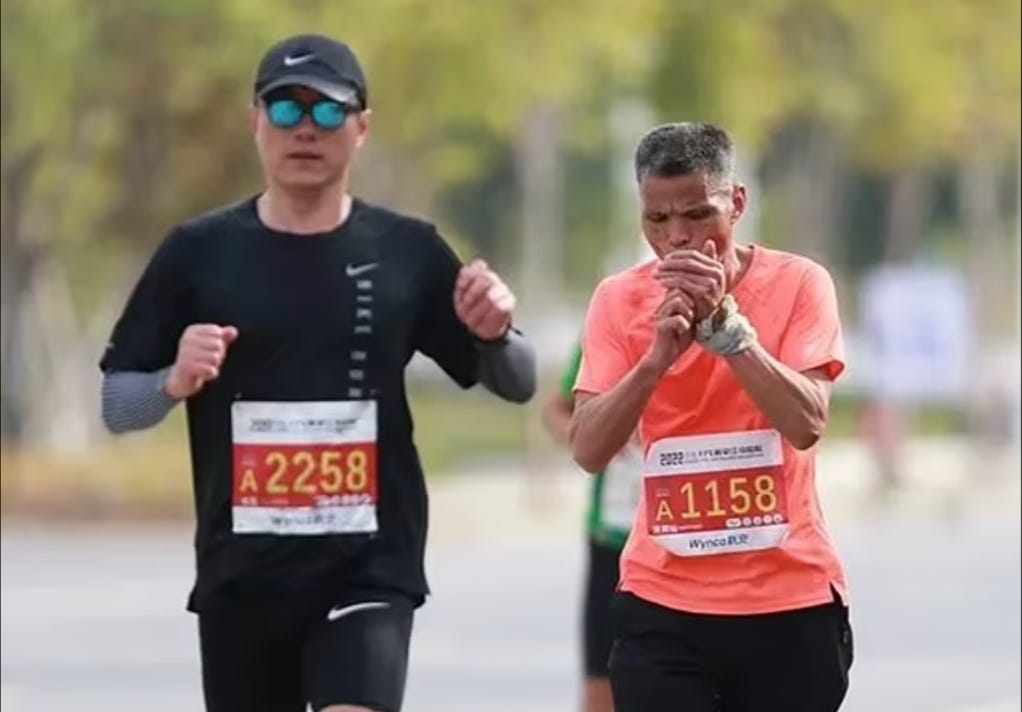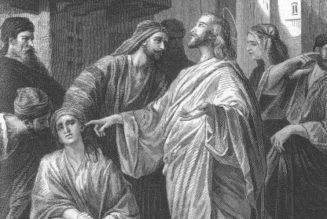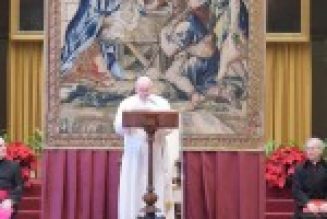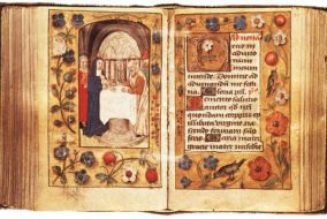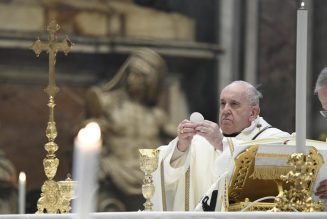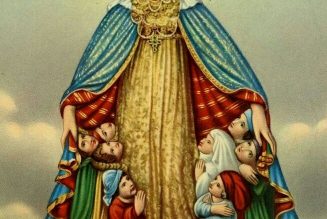Hey everybody,
JD Flynn here, and you’re reading The Tuesday Pillar Post.
As you might realize, our nation has turned its eyes today toward New Hampshire, where a winnowed field of two Republican presidential candidates square off in the battle for the Granite State.
So as long as we’re thinking about New Hampshire, I want to tell you about a New Hampshire Catholic family, and the parish church they built.
St. Mary Church in Claremont, NH, was built in 1823, under the supervision of Fr. Virgil Horace Barber, S.J., its founding pastor.
In fact, the church was built on Fr. Barber’s family property, where the first Catholic boys’ school in New England was also constructed.
But Fr. Virgil Barber, that pastor, didn’t come from a typical Catholic family.
Here’s what happened:
Fr. Virgil’s dad, Daniel Barber, was born in Maryland in 1756. He fought in the Revolutionary War, and became an Episcopalian priest in 1786, when he was 30 years old. He married, had three sons, and moved to New Hampshire. For decades, Daniel was a contented Episcopalian priest.
But one day in 1816, Daniel started reading a Catholic book about the sacrament of orders. The book made him question the validity of his own Episcopalian orders.
He got some more books, and talked with some Catholic priests, and then with some Episcopalian theologians. Daniel became convinced that his Episcopalian orders were invalid. He gave up his Episcopalian parish in 1818.
In the same year, 1818, Daniel’s wife, Chloe, became Catholic, along with several of their children, and Daniel’s sister. It took Daniel a few more years, but he became a Catholic too.
But Daniel and Chloe were not the only family converts, or even the first ones.
Their son Virgil was also an Episcopalian priest for a while in the 1810s, serving happily as the headmaster of an Episcopalian school in New York.
But while he was visiting his parents in 1817, Virgil got into his dad’s Catholic books. He started reading them. He became convinced — pretty quickly — that the Catholic faith was true. So did his wife, Jerusha.
So, in 1817, even before Virgil’s parents became Catholic, Virgil and Jerusha entered the Church — along with their five children. Both Virgil and Jerusha blossomed spiritually in the Catholic Church, and it wasn’t long before they both felt a different calling.
Now, this story would be pretty unusual today but back then, things were done a bit differently.
As they grew in the Catholic faith, Virgil and Jerusha both discerned a call to religious life. Virgil wanted to enter the Jesuits. Jerusha wanted to become a Visitation nun.
Yes, they had five children, but some of them were permitted to accompany their parents into religious novitiates — a highly unusual circumstance. Jerusha and the three oldest girls entered a Visitation convent. Virgil entered the Jesuits, and his son Samuel came along.
Their youngest daughter, Josephine — who was then only 10 months old — was entrusted to a family friend.
In 1820, three years after Virgil and Jerusha entered religious life, they both professed their religious vows at a Mass in Georgetown. Their children were present — and each of those children, including Josephine, eventually entered religious life themselves.
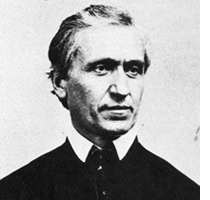
For his part, Fr. Virgil was sent up to New Hampshire after ordination, where he built a parish church on his parents’ land, and opened that school.
He ran both for a couple of years, before becoming a missionary to Indigenous communities. Jerusha became Sr. Mary Augustine, and after final profession, she helped new and growing Visitation communities in Illinois, Missouri, and Mobile, Alabama, where she died in 1860.
The story of that remarkable family is mostly forgotten outside New Hampshire, and even by most people in the state.
Except for this sign, I guess, and a couple of plaques:
With a big day for New Hampshire today, we should pray for the souls of the Barber family, and if they’re now in heaven, we should hope they pray for us.
And here’s one more cool thing. As I mentioned to you, Daniel’s sister became Catholic during the family’s big 1818 conversion. Her name was Mrs. Tyler — for the life of me, I can’t find her first name. After she converted, her husband and children did as well.
Mrs. Tyler’s son became Bishop William Tyler, the first bishop of Hartford, Connecticut — who lived in such austerity and simplicity, among the poor, that he caught consumption and then rheumatic fever, and died at the young age of 45.
So, if he’s in heaven, he can pray for us today, too. And just in case he’s not, pray for his soul, if you would.
The news
Baptismal records are a notation of a historic fact — that a baptism has occurred. For that reason, Church leaders say they won’t comply with those requests. What happens next could set precedent across the whole of the European Union.
The announcement was strange — more transparent than most, but still quite ambiguous about what the archbishop had actually done, or why he no longer enjoys the ordinary faculties of a bishop.
—
Vietnam is an officially atheist, one-party communist state and one of the few countries lacking full diplomatic relations with the Holy See — but for the first time in its history, a papal visit to Vietnam has begun looking like a very likely possibility.
Given the world travels of recent popes, it might seem remarkable that no pope has yet been to Vietnam. But The Pillar’s Luke Coppen explains why it might soon happen, and why Pope Francis could be the first pontiff to visit.
The Pillar talked with Fr. Francis Awotoye, pastor of the Ascension Bodija parish, about what the explosion was like, and what the fallout means for the parishioners of his parish.
—
If you’re like me, you’re a bit nervous these days to get an airplane, what with the possibility of a door plug blowing out, or an engine catching fire.
America has seen a few big aviation mishaps this month, and while they’re still statistically improbable, that doesn’t mean the prospect isn’t a bit scary. So we thought it was a good time to talk about a classic conversation in sacramental theology — the prospect of general sacramental absolution, while a plane you’re on is headed rapidly for the ground.
Buckle your seatbelts, put your tray tables up, and read about it right here.
‘Abashed’ silence
Pope Francis on Monday hosted the International Association of Journalists Accredited to the Vatican, an organization founded in 1978 which has never before had an official meeting with the Roman pontiff.
The pope’s prepared speech for the meeting thanked the Vatican press corps for their dedication to covering the Vatican, and for making sacrifices to do so. The pope’s speech even said that being a journalist is a vocation, that reporters choose to “touch personally the wounds of society and the world,” and in so doing to love the world.
That’s all very nice. But soon after it was published, the speech caught global attention, and not just because the pontiff said those nice things about journalists.
Rather, the pope’s remarks “went viral” after the Wall Street Journal’s Frank Rocca tweeted the portion of the speech in which the pope thanked the Vatican press corp for “the delicacy which you often use when speaking about scandals in the Church: there are so many and I have often seen in you a great delicacy, a respect, an almost — I would say — ‘shameful’ silence: thank you for this attitude.”
I should note that the official English translation, published a few hours later, used the phrase “‘abashed’ silence.”
In either case, the section of the speech was controversial: Thank you, reporters — the pope’s speech said — for reporting on ecclesial scandal with “delicateness” and with a kind of “silence.”
Now, I think the pope probably meant that he appreciates that journalists have chosen to cover abuse scandals with discretion regarding the most prurient details of sexual misconduct. Indeed, that’s a decision that reporters like me have to wrestle with often.
There is a value, when reporting on alleged abuse and misconduct, to providing concrete, tangible details. Those details help shore up the credibility of a story. They also might help other victims of sexual abuse to think through their own experiences, and to come forward about them. And they help Church leaders to identify patterns and vulnerabilities.
And in fairness to the accused, it’s also better to have an allegation’s details known publicly, so that if he wants to refute them, he can address them with specificity, instead of just denying a vague notion of “misconduct” or “imprudent behavior.”
But at the same time, one wants to avoid writing salaciously or with lurid detail about alleged abuse, in a way that disrespects the victim, or makes a spectacle of an alleged event that would have been profoundly traumatic.
So there is a balance there, and I think it is likely that the pope was trying to recognize that.
But the speech didn’t land that way, for a lot of journalists, or for most other Catholics paying attention to it.
And the reason is likely obvious — given the pope’s spotty track record on decisions regarding abuse, his admitted mistakes on that front, and the Vatican’s handling of cases like those of Bishop Gustavo Zanchetta, Cardinal Jean-Pierre Ricard, and Fr. Marko Rupnik, it’s not evident that the pope has a commitment to the kind of transparency that Catholics have called for in recent years.
Indeed, the pope’s own signature accountability and reform process — Vos estis lux mundi — is so devoid of actual transparency that it’s done practically nothing to assure Catholics that abuse and its cover-up are being seriously investigated and seriously handled by ecclesiastical officials.
When a pontiff is under fire for failing to establish transparent processes, praising “‘abashed’ silence” from reporters is not likely to garner appreciation.
Coupled with that is the fact that in the Vatican’s own McCarrick report, at least one member of the Vatican press corps conceded that he hadn’t pursued rumors about former cardinal Theodore McCarrick because he was concerned, in part, about losing the cardinal as a source. That admission has led some critics to speculate that the established Vatican press corps is not always zealous about covering abuse and misconduct — and for some, the pope’s praise for their discretion seemed to confirm theories about a back-scratching symbiosis between the pontiff’s men and their local court reporters.
For context to all this, I want to tell you first-hand something you probably already know: While the pope has praised journalists and urged them to do investigative work in the Church, appreciation for that work is not universal in the Church.
When I think about the Church’s reform and renewal, I am edified by the number of bishops who read The Pillar, and who express appreciation for our commitment to investigating abuse, cover-up, and misconduct among ecclesiastical leaders. I am edified by how often they tell us to “keep going,” because of what that likely signifies about their own commitment to good governance of their dioceses.
But I can also recall the time when a ranking Vatican official chided me for “hurting the Church” by reporting the existence of a Vos estis lux mundi investigation. He asked me why, if I am really a Catholic who loves the Church, I would “shame” her by reporting on the fact that a bishop was under investigation.
And I think about what happened a few years ago, after The Pillar reported on the misconduct of a ranking ecclesiastical official in a leadership position. Soon after, an American bishop approached me privately, to say that such reporting could ruin people’s lives — and that if a cleric eventually took his own life because of our reporting on his misconduct, well, that would be our responsibility to bear before God, at our judgments.
I thanked the bishop for the feedback, and asked for his blessing, but I disagreed with him, as you can well imagine.
I tell you those stories because it seems to me that they are context for how the pope’s remarks have been interpreted in some corners.
In a Church in which telling the truth can be seen as an act of rebellion, or disobedience, pontifical praise for ‘silence’ on the moral crisis of abuse was never likely to land well.
Of course, I’m not a member of the International Association of Journalists Accredited to the Vatican. I know some very fine journalists who are. But the pontiff wasn’t talking to The Pillar in this case. I’m not sure that he’d be as laudatory about our work.
Smoking fast
Finally, I want to tell you about a Chinese marathon runner, who goes by the nickname “Uncle Chen.”
On Jan. 7, the runner finished the Xiamen Marathon in 3 hours and 33 minutes, a respectable time for anyone, especially a 52-year-old.
And Uncle Chen’s time was even more respectable when you consider this: He chainsmoked cigarettes for the entirety of the race, a feat which ultimately merited him a disqualification in marathon, but only he’d crossed the finish line.
Smoking is bad for you, and anything more than the occasional cigarette is a vice to be put out, poor stewardship of the body God has created.
But there is something remarkably charming about Uncle Chen puffing away along the course, and still managing to finish in a pretty decent time. And while corpulent runners (like me) are celebrated in the NY Times, you’d hope we could make room for other people who don’t fit the running stereotypes — including Uncle Chen and his carton of Kools.
Of course, Chinese racing authorities think Chen’s smoking is kind of a drag, which is why they created new rules last year to prohibit cigarettes on marathon courses.
Before that, Chen had lit up the competition in other races, finishing with pretty good times in previous marathons. But now his racing dreams are up in smoke.
While Chen’s smoking on the course is clouded with criticism, maybe some context would clear the air.
Ranchers in my state, Colorado, have raised concern in recent months about the litter left behind on their ranches, by bicycle races in the state’s rural regions — among that litter is human waste, and soiled undergarments discarded into fields where cattle graze.
Bike racers shouldn’t defecate on the fields where our food is fed.
Compared to that, Uncle Chen’s social foible seems nearly considerate.
So while he’s disqualified from Chinese racing, I’d like to invite Uncle Chen to come to Colorado for a run. I’ll take him to see some truly wild bike racing behavior.
We can even go for a run together — but no cigarette for me, please. At least not until we’re having a beer after the race.
—
As always, readers, please be assured of our prayers, and please pray for us — we need it.
Keep the faith!
Yours in Christ,
JD Flynn
editor-in-chief
The Pillar
Editor’s note: In the initial publication of this newsletter, I mixed up Daniel and Virgil Barber in a few spots. The story has been corrected. But not before it hit your inbox, of course.
Comments 41
Services Marketplace – Listings, Bookings & Reviews
